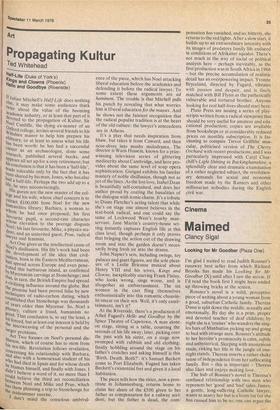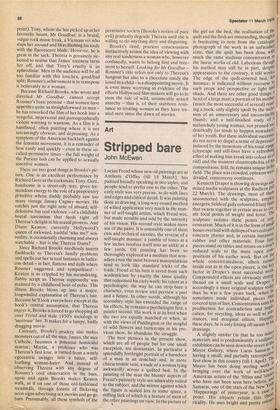Cinema
Maimed
Clancy Sigal
Looking for Mr Goodbar (Plaza One) I'm glad I waited to read Judith Rossner's runaway best seller from which Richard
Brooks has made his Looking for Mr Goodbar (X) until after I saw the movie. If I'd read the book first I might have ended up throwing bricks at the screen.
Rossner's novel is a solid, perceptive piece of writing about a young woman from a good, suburban Catholic family. Theresa Dunn is split down the middle, sexually and emotionally. By day she is a prim, proper and devoted teacher of deaf children; by night she is a 'cruiser' who wanders the singles bars of Manhattan picking up and going to bed with strange men. Rossner's attitude to her heroine's promiscuity is calm, subtle and unhysterical. Sleeping with anonymous studs, risking her life in the jungle of onenight stands, Theresa asserts a rather shaky sense of independence from her suffocating family. But — this is important — Theresa also likes and enjoys making love.
The hub of Rossner's novel is Theresa's confused relationship with two men who represent her 'good' and 'bad' sides. James, a gentle, long-suffering Catholic lawyer, wants to marry her but is a lousy lay (or she has caused him to be so; one can argue the point). Tony, whom she has picked up at her favourite haunt, Mr Goodbar, is a brutal, vulgar rock music freak, a Vietnam vet who slaps her around and likes flashing his knife with the fluorescent blade. However, he is great in the sack. Theresa is genuinely sickened to realise that James' niceness turns her off, and that Tony's cruelty is an aphrodisiac. Men in the audience will be all too familiar with this love/sex, good/bad split; Rossner's achievement is to transpose it believably to a woman.
Because Richard Brooks, who wrote and directed Mr Goodbar, cannot accept Rossner's basic premise — that women have appetites quite as straightforward as men — he has reworked the film of her book into a vengeful, impersonal and pornographically violent warning to wantons. As a film it is hamfisted, often puzzling where it is not screamingly obvious, and depressing. As a symptom of the American backlash against the feminist movement, it is a reminder of how easily and quickly — even in these socalled permissive times — the full weight of the Puritan lash can be applied to sexually assertive women.
There are two good things in Brooks's picture. One is an excellent performance by Richard Gere as the cocksman, Tony. Gere, handsome in a street-oily way, gives tremendous energy to the role of a proprietory primitive whose daddy probably saw too many vintage Jimmy Cagney movies. He catches just the right note of absurd, selfdefensive but real violence — of a childishly brutal narcissism that feeds right off Theresa's delight in his sexual prowess. And Diane Keaton, currently Hollywood's queen of awkward, bashful 'who me?' sensuality, is occasionally charming and always watchable — but is she Theresa Dunn?
Since Richard Brooks needlessly inserts flashbacks to Theresa's family problems and spells out her sexual fantasies in ludicrous detail — in fact, flattens and dulls where Rossner suggested and sympathised — Keaton is as crippled by his meandering, flabby script as Theresa supposedly was maimed by a childhood bout of polio. This illness Brooks blows up into a major, longwinded explanation of Theresa's lust. Because he'll look everywhere except at the book's central assumption, that Theresa enjoys it, Brooks is forced to go shopping all over Freud and stale 1950's sociology to 'motivate' her. It makes for a lumpy, badly dragging movie.
Curiously, Brooks's prudery also makes monsters out of all the men. James, the nice Catholic, becomes a potential homicidal maniac; Martin, a professor who was Theresa's first love, is turned from a wanly egocentric swinger into a bitter, self loathing woman-hater. And instead of observing Theresa with any degree of Rossner's cool observation in the bars, again and again Brooks makes Keaton walk, as if on one of those old-fashioned treadmills, through forests of flickering neon signs advertising sex movies and go-go bars. Presumably, all these symbols of the permissive society (Brooks's notion of pure evil) gradually degrade Theresa until she is willing to do anything dirty and disgusting.
Brooks's tired, prurient consciousness instinctively resists the idea of viewing with any real tenderness a woman who, however confusedly, wants to belong first and foremost to herself. Looking for Mr Goodbar — Rossner's title refers not only to Theresa's hangout but also to a chocolate candy she loved as a child — is a disappointing movie. It is even more worrying as evidence of the efforts Hollywood film-makers will go to to ' stem the tide of wild, untameable sexual anarchy — that is, of their stubborn resistance to treating women as they have treated men since the dawn of movies.



































 Previous page
Previous page